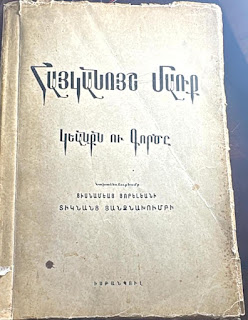I: Armenia Sings to the Black Sea
My teeth, the songbirds, age with snow,
the winds plough wrinkles on my face,
and each of these stones, my bones,
has a sea gull for a heart, caught in its marrow.
I dream of my hair, sails,
my fingers, sailors,
and seasons of God's breath
blowing in my hair.
The apparition of a horse
haunts my mind, the storage
of Ararat's ancient tales.
The sound of swords slamming
against blood-black sacrificial
altars of foreign gods, echoes
in the hollow of my hands.
My hands, in dreams, are seashells,
splashing blue secrets into my ear.
My soul is a soft shore
in my dreams, salt in her words.
Arax, my bloodstream, sings my life
to me. Wolves drink from the banks
of Arax, when you, my lost lover, my sea,
gone with the leaf and the wind,
are aeons of annals away,
the memory of motherhood
in an ancient woman's leather breasts.
Venice... sails of silk . . .
wet under the vulture's wing –
sunburst after clouds,
sunstroke after snow –
turquoise of your water
into drops of sweat. . . .
My mad daughter in my room, Arax
walks round and round my heart.
Shattered ships, scattered driftwood,.
the sunken skeletons of my firm-breasted yesterdays,
disturb my dreams, my sea, O husband
of fish soul, and black heart.
II: The Seafarer Sings to Armenia
My fate soaks in the diary of a wave.
Wind pulls at the sea's white hair,
sea screams the piercing cold of her shells
into the pearls of my spine, night's necklace
breaks and splashes into the sea, sparks
and patches of smoke rise to the deck.
With salt in my lungs,
I make my way through water
to water, never reaching you.
Stories of you reach the islands of my days
and suckle me to sleep, and to sunrise,
woman of my father's eyes
and mother's hair.
Wind and water recognize
among sea-blue flowers and sun-gold grass,
the two black buds blooming
in my blood-rimmed eyes,
offspring of seeds
slipped through your fingers.
Dusk settles ancient dust
on the roofs of Yerevan,
my hair grows gray.
The mountain my mother milked every morning
for my snow, is left untended,
milk oozing from her swollen breast.
Longing, I weep my daughter's watery arms.
My winged arms, in dreams,
are sheltered in winter with wool
your hands weave in your sleep.
Winds of these steel cities
have plucked feathers
from my wheat-old wings and pressed them
with dying flowers
in the history books of lonely girls.
Your mirage appears through the angle
of a gray angel's wing, spread above a factory.
Images of you meet my mouth with bird-beaks.
From the idle islands no one sings,
no bird leads to harbor,
no harbor leads to you.
Pillaged caravans, crushed villages,
the rotting corpses of my stallion yesterdays
disturb my dreams, my home, O wife
of snow soul, and bone heart.
III: The Wedding Song
Shattered stained-glass windows
scattered on the dry sand...
Though I draw His face on the cave's wall
He does not come to me.
The souls of wolves caught
in the starving wind, have set
the pieces of glass, words
I have gathered, to music . . . .
Of children's mouths, opening
into petals of holy colors
I sing
to myself, of the autumn wind I sing
rushing through the sleep of yellow leaves.
Quicksilver rises through the pearls of my spine.
My eyes are on the wind
in the eyes of my son,
on this torn paper bag,
on the marbles of dead days
scattered all over the street.
I cannot catch the wind
in this torn bag,
with these eyes of marble
I cannot love.
Heavy with a scream, my tongue
the wave, rises
but drops. Through the songbirds,
my snowy teeth, your name blows
with the blood-warm breeze of aeons
of summers and springs:
Ani... Ani...
anointed with the milk of snow.
The affluence of answers decorates
the ancient throat of your columns, Ani.
The powder of the black petals in my eyes
and your stones: that alchemy
molds my bones - the nests
of sea gulls, the fields of wheat.
My lips season fish-words with salt,
with salty lips I sail your name, Ani,
on seven seas.
Your scattered bones, my spoils, words
of many colors, pieces of glass cut with diamonds,
meet into a window and shield my son
from the wild, piercing wind.
Ani... Ani... your name still sings to me.
My silk-wings are your sails,
on your stone-thighs I stand.
In your forests of my hair, songbirds sing,
and fishes lay eggs in the Van and Sevan of my eyes.
I, mountain, hold high the drowning child of the ark.
My arms are your borders,
my fingers, your sentinels.
The wheat-mane of my son will dance, Ani,
as he harvests the winds
in your fields.
Ani,
water, palm tree, home,
oh Ani,
through the pieces of night
on these desert-flat pages,
through the black cracks
of these white columns,
you sing to me.
This poem appeared in the Winter 1981 issue of Ararat












